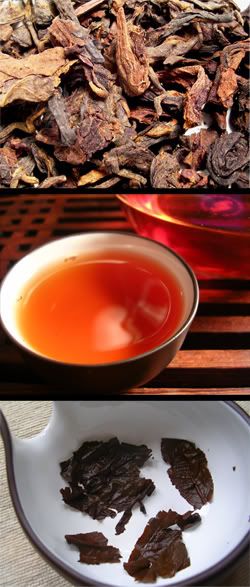Imagine my surprise when I turned up at the venue for the next three days to find the following:

It's set in lovely grounds, in a tiny old-fashioned village, out in the middle of nowhere, somewhere in the north of England (Cheshire). Sadly, the tea's still no good - but I have brought more than enough to see me through. I'm happy to see a pleasant 15cl teapot on my dressing table.
It was at this conference, though not this venue, that I met Xiaomao three years ago, and we married a year later. Because of this, my colleagues believe that this conference is a dating agency...
As promised in my last post, it's time to cast a critical taste-bud over the Menghai Shuilanyin [water blue label], apparently so called due to the ink used in the neifei (to which I don't have access, as this is but a sample). Guang has dry-stored this since 2004, in Houston. This bing is, apparently, a "special production" of Menghai, and so promises a higher selection of leaf than the usual Menghai bulk-purchase of leaves.
~15cl Caledonian Springs @ 100C in 35cl shengpu pot; ~5g of leaf; 1 rinse
 Dry leaves:
Dry leaves:Rich chocolate, mixed with black. Rather tippy, testament to the "special production" status. Somewhat wet-stored in its aroma. You'll note a dusting of white flecks in the photograph; Guang's dry storage has done rather well in neutralising the "wet-storage" aroma to some degree, but it is still present.
15s, 10s, 15s, 20s, 30s, 35s, 40s, 50s, 90s:
Note the large number of infusions (for one person - I'm drinking all this alone at the moment, whereas usually there would be two of us to consume the volume of tea and thus reach higher numbers of infusion). This indicates that the tea went down rather well.
First of all, I should confess: after the fourth infusion (20s), I went to bed and left the tea sitting in the pot overnight. After resuming at the fifth infusion (30s), the tea had changed character a little - in a highly pleasant way. I'll describe each session briefly.
Initially, the lid-scent was damp mushroom, and I was immediately reminded of my old friend, the 1998 Menghai "Peacock" tuocha, and its cousin, the 1998 Menghai Dayi tuocha. Clearly a Menghai, right from the aroma of the lid. The leaves are thick and medicinal in aroma, with a hint of their youth remaining.
The soup is very thick, and a pleasingly rich orange colour, as may be seen from the photograph. The feeling in the mouth is excellent, providing plenty of smooth tea-oil. There is a wet-stored flavour, which I find pleasant, and throughout it is the constant tone of its youth, that mellowed and yet obvious sweet-bitterness from foretaste to aftertaste. This definitely seems to be in an enjoyable stage of middle-agedness. The qi is rather vivid, causing flushing throughout my limbs, but this has the misfortune of having to compare with immense qi from the 60s GYG from yesterday.
Coming back the next day, the wenxiangbei was filled with particularly sweet, creamy vanilla. It was genuinely lovely. Was this a function of leaving it for ten hours, overnight? Would the tea have taken on this characteristic anyway? These are questions for a subsequent tasting. That vanilla then proved evident throughout the flavour. The good huigan, the nasal "wet storage", the constant tone of "youth" were all surrounded by that very pleasant vanilla-cream.
Wet leaves:
On the whole, small and young. However, there were a few real bruisers in there, clearly taken from absolutely whopping leaves, as may be seen in the above photograph. It's an interesting blend. It's very definitely not the usual Menghai mulch.
Overall:
The youth is present, but it is riding through an undergrowth that is already becoming rich and deep. It's smooth - the youth is just that constant tone, rather than any aggravating sensation in the throat. Unlike many ten-year-olds, this has a decent basis of rich, deep flavours.
The whole bing is $220. Is this tea $220-worth of goodness? That's a hard call. It needs more time, but has very good potential in flavour and qi. If the overnight-vanilla modification comes about through normal consumption of the tea in one session, that would also be an argument in its favour. It is good... but I don't know if it's that good. For the cost of five of these, one could buy a 60s GYG...

5 comments:
Leaving a vessel full of wet leaves overnight, only to resume drinking the next day is a typical occurance for myself. Does it change things? Yes, I think so most certainly. It is a whole new can of worms to open however, and is far less quantitative/qualitative than other parameters. (Its along the lines of something like 'pour time', or 'barometric pressure'.)However, My fascination with tea stems from an appreciation of discovering and observing the process of an entity becoming, as they say, "a product of its enviorment". The constraints are perhaps infinite.
I spoke very highly of this tea earlier, with a bit more gusto than I would typically. You touched upon my reasoning. This tea is not ten years old. It has just turned the corner, it is only just now getting through its "youth" and is already a wise old man.
I plan on taking at least a decade to drink this beeng, and I would not consider myself much of a collector. My closets are not stuffed full of 2 and 3 years old beengs. I will do my very best not to quaff, because this is a tea im going to enjoy watch growing.
Let me know if you do not have enough leaves for a second encounter.
kind regards,
Ian
Dear Ian,
I'm tempted to try the "overnight" method with some teas that I'm more familiar with, to see what effect it has. I suspect that the vanilla-cream in this shuilanyin, for example, was there from the outset, but that the overnight cessation may have emphasised it. The result was quite strikingly good, though.
This tea is definitely turning the corner. It has lost the green aggravation, and its bitterness is just a constant tone - the other
flavours are very rich and increasing in amplitude already.
I definitely recommend taking this tea slowly, as you say - it's particularly potent before bedtime... making it rather hard to get off to sleep!
Thanks muchly for the offer of a sample - I might well be taking you up on the offer later. ;)
Toodlepip,
Hobbes
hobbes:
thanks for this review. however, today i broke out my sample of the same tea, and although i agree that it has some wonderful properties, i found it to be significantly lacking in qi.
perhaps you received a lucky sample, or i an unlucky one? i suppose there are a number of possible explanations for this variance...
best,
mike
It's possible that receptivity to these sorts of subjective quantities depends very much on personal state - I was quite worn out, for example, when trying the shuilanyin, and perhaps more open to qi-induced flushes. I suspect that, had I tried this tea in the "cold light of day", I would have possibly experienced something else. A second tasting is most definitely required.
Wonderful properties, yes, but - just as you said in your e-mail... are those properties $225/bing? The jury is still out, and not looking as if they will return a favourable verdict.
Toodlepip,
Hobbes
My notes are similar to yours (minus the vanilla part), yet I didn't really enjoy the tea. I have enough leaf to try it one more time. Perhaps I'll actually enjoy it next time.
Post a Comment